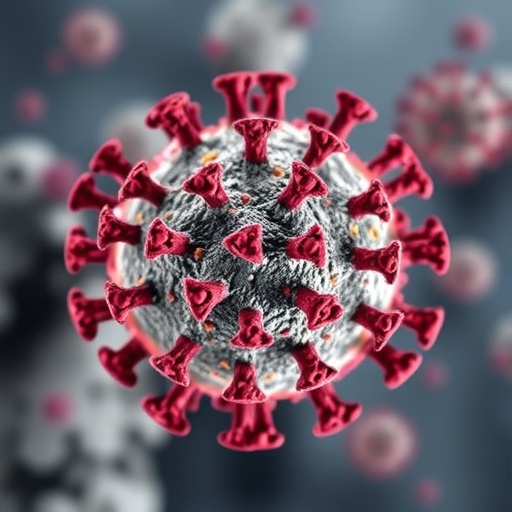In a groundbreaking study, researchers have utilized advanced immunoinformatics techniques to design a multi-epitope vaccine aimed specifically at combating the Machupo virus, a significant biological threat. This effort represents a transformative leap in the field of vaccine development, utilizing computational approaches to identify and refine epitopes that can stimulate a robust immune response. The project, spearheaded by a dedicated team of scientists, reflects an increasing understanding of viral mechanisms and the power of bioinformatics in creating tailored healthcare solutions.
As the world grapples with various viral outbreaks, the need for novel and effective vaccines has never been more critical. The Machupo virus, which causes Argentine hemorrhagic fever, presents severe risks not just to individual health but to public safety as a whole. With its high mortality rate and potential for outbreaks, researchers have accelerated their efforts to develop protective strategies, among which vaccination remains the most effective long-term solution.
The research team employed a systematic approach that begins with the identification of potential epitopes from the Machupo virus. The researchers meticulously analyzed viral protein sequences, utilizing databases and computational algorithms to predict which regions could effectively elicit immune responses. These epitopes, which are the smallest units of the virus recognized by the immune system, serve as the foundation for the vaccine’s efficacy.
In their study, the team compiled a diverse array of epitopes that covered multiple proteins of the Machupo virus, allowing for a multifaceted immune response. This multi-epitope strategy not only enhances the probability of triggering an immune response but also increases the chances of longevity in that response. The team’s use of high-throughput screening methods accelerated the selection process, allowing for rapid validation of epitope candidates in vitro.
After identifying promising candidates, the researchers further refined their approach through a series of simulations and predictive modeling. These methods included docking studies and immunogenicity predictions that evaluated how well the selected epitopes might bind to major histocompatibility complex (MHC) molecules. By ensuring that each epitope had a high binding affinity, the team enhanced the likelihood that the immune system would recognize and respond to the vaccine.
Moreover, the research team undertook a comprehensive analysis of potential adjuvants, substances that can boost the immune system’s response to the vaccine. By incorporating effective adjuvants into their vaccine design, the researchers aimed to ensure that the immune system would not only recognize the epitopes but would also respond vigorously—a critical consideration in the battle against viral pathogens.
In animal models, the scientists observed an encouraging immunological response once the vaccine was administered. The results suggested that the elicited antibodies were capable of neutralizing the Machupo virus, demonstrating the vaccine’s potential effectiveness. These early-stage results are promising, indicating that the vaccine could form a part of a critical strategy in preventing Machupo virus infections in the future.
While these findings are largely preliminary, they underscore the importance of the body’s adaptive immune response, particularly in the development of vaccines against viruses that have historically been challenging to combat. The complexity of the Machupo virus, with its ability to evade immune detection, makes vaccine development particularly daunting. However, with the innovative immunoinformatics-driven approach, researchers are poised to make significant strides in the fight against this and similar viruses.
The study also raises broader implications for the field of vaccinology. By showcasing the power of digital technologies in bioinformatics, this research sets a precedent for future vaccine development efforts, especially amid rising global health challenges. The integration of bioinformatics not only enhances the rapidity of research but also provides deeper insights into pathogen diversity and immune response strategies.
In summary, the successful design of a multi-epitope vaccine against the Machupo virus embodies a significant step forward in immunization science—a convergence of computational biology and virology. With the research paving the way for subsequent clinical trials, the scientific community is awaiting the next benchmarks in ensuring safety and efficacy before this vaccine can be considered for wider use. Collaboration between researchers, health organizations, and regulatory bodies will be paramount as this project moves toward real-world applications.
As we look to the future, the implications of such innovative research can extend beyond the Machupo virus itself. The frameworks established through this study could be adapted to tech-savvy vaccine development against an array of other viral pathogens, bridging the gap between computational advancements and urgent public health needs. Such a dynamic approach fosters hope for quick-responsive public health strategies in an increasingly interconnected world facing the ever-evolving threat of zoonotic viruses.
In conclusion, the immunoinformatics-driven design of a multi-epitope vaccine against the Machupo virus is not just a localized effort; it symbolizes hope in the global fight against infectious diseases. With continued support, research, and collective action, we may be on the cusp of overcoming viral threats that have pursued humanity for decades. The implications of this research extend far beyond the laboratory, promising that the tools we develop for today will prepare us better for the viral challenges of tomorrow.
Subject of Research: Machupo virus vaccine development
Article Title: Immunoinformatics-driven design of a multi-epitope vaccine for effective protection against Machupo virus.
Article References:
Alamri, A., Almutairi, S., Al Rokayan, S. et al. Immunoinformatics-driven design of a multi-epitope vaccine for effective protection against Machupo virus.
Mol Divers (2025). https://doi.org/10.1007/s11030-025-11249-9
Image Credits: AI Generated
DOI: 10.1007/s11030-025-11249-9
Keywords: multi-epitope vaccine, Machupo virus, immunoinformatics, vaccine development, bioinformatics, epitope design, immune response.




